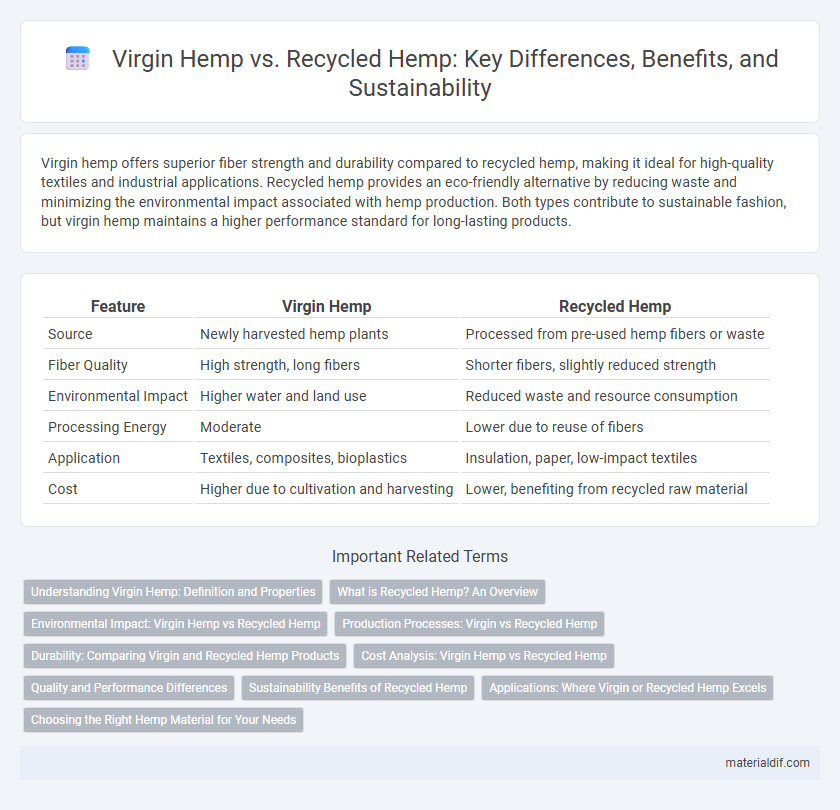Virgin hemp offers superior fiber strength and durability compared to recycled hemp, making it ideal for high-quality textiles and industrial applications. Recycled hemp provides an eco-friendly alternative by reducing waste and minimizing the environmental impact associated with hemp production. Both types contribute to sustainable fashion, but virgin hemp maintains a higher performance standard for long-lasting products.
Table of Comparison
| Feature | Virgin Hemp | Recycled Hemp |
|---|---|---|
| Source | Newly harvested hemp plants | Processed from pre-used hemp fibers or waste |
| Fiber Quality | High strength, long fibers | Shorter fibers, slightly reduced strength |
| Environmental Impact | Higher water and land use | Reduced waste and resource consumption |
| Processing Energy | Moderate | Lower due to reuse of fibers |
| Application | Textiles, composites, bioplastics | Insulation, paper, low-impact textiles |
| Cost | Higher due to cultivation and harvesting | Lower, benefiting from recycled raw material |
Understanding Virgin Hemp: Definition and Properties
Virgin hemp refers to hemp fibers extracted directly from the plant without undergoing any prior processing or recycling, ensuring maximum fiber strength and durability. It retains its natural color, texture, and high tensile strength, making it ideal for applications requiring superior quality such as textiles, composites, and bioplastics. The chemical composition of virgin hemp includes high cellulose content, minimal impurities, and natural lignin, which contribute to its unique biodegradability and mechanical properties.
What is Recycled Hemp? An Overview
Recycled hemp is derived from post-consumer or post-industrial hemp fibers that are repurposed to produce new textiles or materials, reducing waste and environmental impact. This process involves breaking down old hemp products into fibers that retain much of the original's durability and sustainability benefits. Compared to virgin hemp, recycled hemp supports circular economy principles by minimizing raw resource extraction and energy consumption.
Environmental Impact: Virgin Hemp vs Recycled Hemp
Virgin hemp cultivation involves growing new hemp plants, which requires land, water, and energy inputs, contributing to resource consumption and carbon emissions. Recycled hemp fabric repurposes existing materials, significantly reducing waste and lowering the environmental footprint by minimizing water use and chemical processing. Choosing recycled hemp supports circular economy principles, making it a more sustainable option for textile production and reducing the demand for new agricultural resources.
Production Processes: Virgin vs Recycled Hemp
Virgin hemp is derived directly from freshly harvested hemp fibers, undergoing processes such as retting, decortication, and combing to preserve fiber length and strength. Recycled hemp involves reprocessing pre-used hemp textiles or waste materials through mechanical or chemical recycling techniques, which often reduces fiber quality and length. Production of virgin hemp emits fewer contaminants compared to recycled hemp processes that may require additional treatments to remove dyes and impurities.
Durability: Comparing Virgin and Recycled Hemp Products
Virgin hemp fibers exhibit superior durability due to their long, unprocessed strands, providing enhanced strength and resistance to wear. Recycled hemp, while environmentally friendly, often contains shorter fibers that may lead to reduced tensile strength and increased susceptibility to fraying over time. Choosing virgin hemp products ensures longer-lasting performance, especially in applications requiring robust material endurance.
Cost Analysis: Virgin Hemp vs Recycled Hemp
Virgin hemp typically incurs higher costs due to agricultural production, harvesting, and processing, resulting in premium pricing for raw fibers. Recycled hemp offers significant cost savings by repurposing existing materials, reducing the need for energy-intensive cultivation and minimizing waste management expenses. Cost analysis reveals that recycled hemp provides a more sustainable and economical option for manufacturers aiming to balance quality with budget constraints.
Quality and Performance Differences
Virgin hemp fibers exhibit superior durability and strength due to their unprocessed, natural composition, resulting in higher-quality textiles with enhanced tensile properties. Recycled hemp, while offering environmental benefits, often shows reduced fiber length and tensile strength, which can compromise fabric performance and longevity. Manufacturers must balance quality demands with sustainability goals when choosing between virgin and recycled hemp materials.
Sustainability Benefits of Recycled Hemp
Recycled hemp significantly reduces environmental impact by minimizing waste and lowering resource consumption compared to virgin hemp, which requires fresh cultivation with water and land inputs. Utilizing recycled hemp fibers supports circular economy practices, decreases carbon emissions, and conserves raw materials, enhancing overall sustainability in textile and manufacturing industries. This approach not only extends the life cycle of hemp products but also aligns with eco-friendly production goals by reducing reliance on intensive agricultural processes.
Applications: Where Virgin or Recycled Hemp Excels
Virgin hemp fibers offer superior strength and durability, making them ideal for high-performance textiles, construction materials, and automotive composites. Recycled hemp excels in eco-friendly packaging, insulation products, and casual apparel, where sustainability and cost-effectiveness are prioritized over maximum fiber strength. Both types of hemp contribute to reducing environmental impact, with virgin hemp providing premium quality and recycled hemp supporting circular economy initiatives.
Choosing the Right Hemp Material for Your Needs
Virgin hemp offers superior strength, durability, and purity, making it ideal for high-quality textiles, construction materials, and health products. Recycled hemp provides an eco-friendly, cost-effective alternative with a smaller carbon footprint, suitable for insulation, composite boards, and certain apparel. Selecting the right hemp material depends on balancing performance requirements with sustainability goals and budget constraints.
Virgin hemp vs Recycled hemp Infographic

 materialdif.com
materialdif.com